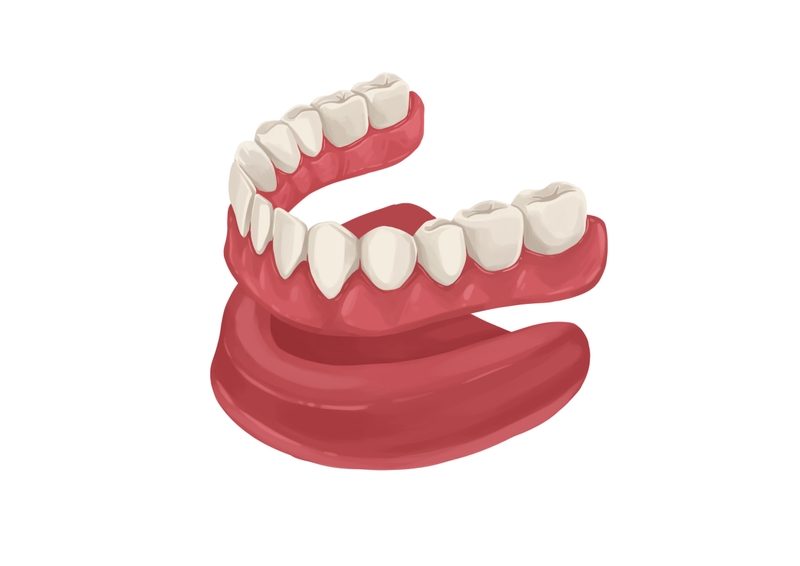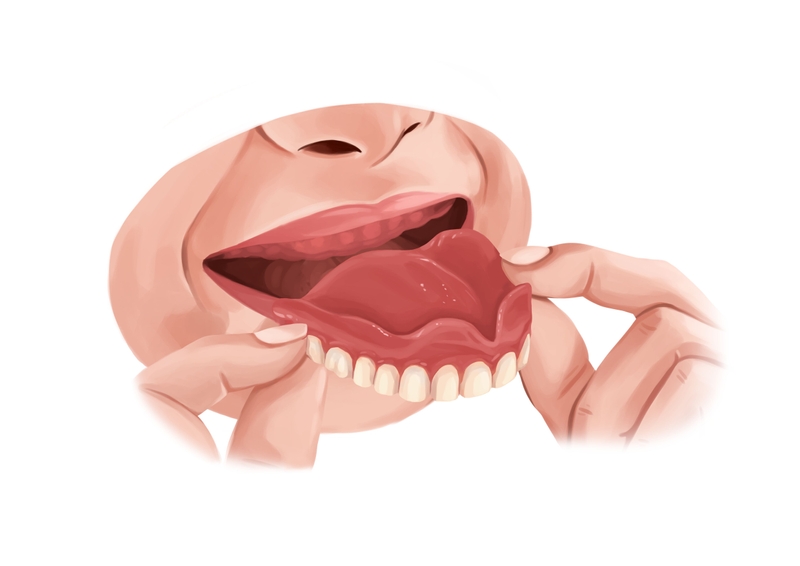- Sleeping with your dentures can cause them to wear out more quickly.
- It also causes direct dental problems such as stomatitis and denture sores.
- Not removing dentures before going to bed can even lead to pneumonia.
Use Authority Dental to book an appointment for the one day dentures near you, or sign up for a dental discount plan and save up to 60% on all dental procedures, including dentures.
Is it ok to sleep with your dentures? Here's everything you need to know.
Consequences of sleeping with dentures

Picture by Authority Dental under CC 2.0 license
Not everyone realizes that leaving your dentures in overnight can have such severe side effects. If you forget and leave them in for one night, hopefully you will not experience any serious issues. However, even just one night can cause minor problems in some cases. Let's talk about the four most common complications.
Denture sore
Dentures sit right on top of your gum tissue. When you eat and speak, the friction between the denture and the gums can cause sore spots. Once you have had your dentures for a while and enough adjustments have been made, you will not experience frequent denture sores.
However, leaving your dentures in all night causes unnecessary friction and can create sores that would have otherwise never happened.
Stomatitis
One of the most common side effects of sleeping with dentures is denture stomatitis. This presents as a red, inflamed palate (the roof of your mouth) that is infected with fungi (yeast microorganisms). This gum inflammation will cause you (and others) to notice that you have awful breath. Fungi can also enter the corners of your mouth and cause angular cheilitis.
If you have denture stomatitis, your dental professional will need to prescribe medication, and you may need to refrain from wearing your denture for a few days.

Pneumonia
Studies show that people who sleep with their dentures are more than twice as likely to get pneumonia, a lung infection that can be very serious and even deadly in some cases. That may surprise you. How can dentures be related to your lungs?
The pneumonia-causing bacteria travel from the mouth to the lungs. If you do not remove your dentures at night, they can act as a breeding ground for numerous bacteria and fungi. More bacteria can then enter the lungs, causing an increase in pneumonia cases. This is especially true for nursing home residents, as they often have limited access to care compared to healthier adults.
Lee warns, "the risk is much more serious than local irritation," explaining that "the denture's surface acts as a breeding ground, creating a sticky biofilm full of bacteria and fungi."
"We are particularly concerned about the evidence linking sleeping in dentures to an increased risk of aspiration pneumonia, especially in older or medically compromised individuals," he notes, adding that "the bacteria that thrive on the denture can easily be aspirated into the lungs."
"Think of it as wearing the same shoes every second for a year—they break down, and you get foot fungus. The denture is no different. The good news is the solution is simple: a gentle brush, a soak in cleanser or water, and a few hours of rest for your gums. It is a non-negotiable, essential habit for long-term health and preventing serious illness," Lee emphasizes.
Dentures damage
If your dentures become damaged, search for a nearby denture repair lab to have them fixed.
Dentures wear out over time. Failing to take proper care of your denture can cause it to break down quickly. Leaving your dentures in at night introduces them to unnecessary bacteria and fungi. Additionally, they may not be properly cleaned. Failure to brush and soak your dentures can cause them to stain and crack.
There are rare instances when you may be instructed not to remove your denture when going to bed at night. Permanent dentures are not removable and are worn at all times. You should discuss oral health care with your dentist if you have this type of denture.
Remove your dentures at night

Picture by Authority Dental under CC 2.0 license
Sleeping in dentures is a bad idea. It will just take a few minutes to perform the oral hygiene routine your dentures need to last longer. Ensure that you remove all food particles and denture adhesive using a denture brush and warm water. Then, soak your dentures in water or denture cleanser while you sleep.
You will also need to perform good oral hygiene. Ensure your mouth is free of any food and adhesive. If you have any remaining natural teeth, brush them with regular toothpaste. Do not forget to floss. You should also brush your tongue to remove bacteria that could increase your risk of the above-mentioned problems.
FAQ
Do partial dentures need to be removed at night?
In almost all cases, dentures should be removed at night to prevent adverse side effects, such as sore spots, stomatitis, damage to the dentures, and even pneumonia. If you have implant dentures that are not removable, ask your dentist for guidance on caring for your soft tissue.
How long should I leave my dentures out?
You should leave your dentures out for about eight hours. This will give your gum tissue time to breathe and prevent the buildup of harmful bacteria and fungi.
Harry Lee, DMD
It is a frequent question in my practice: "Do I really have to take my dentures out at night?" Many patients tell me they remove them in the morning, finding it inconvenient to do so. However, as dentists, this is one piece of advice we cannot stress enough, and it goes far beyond simple comfort.